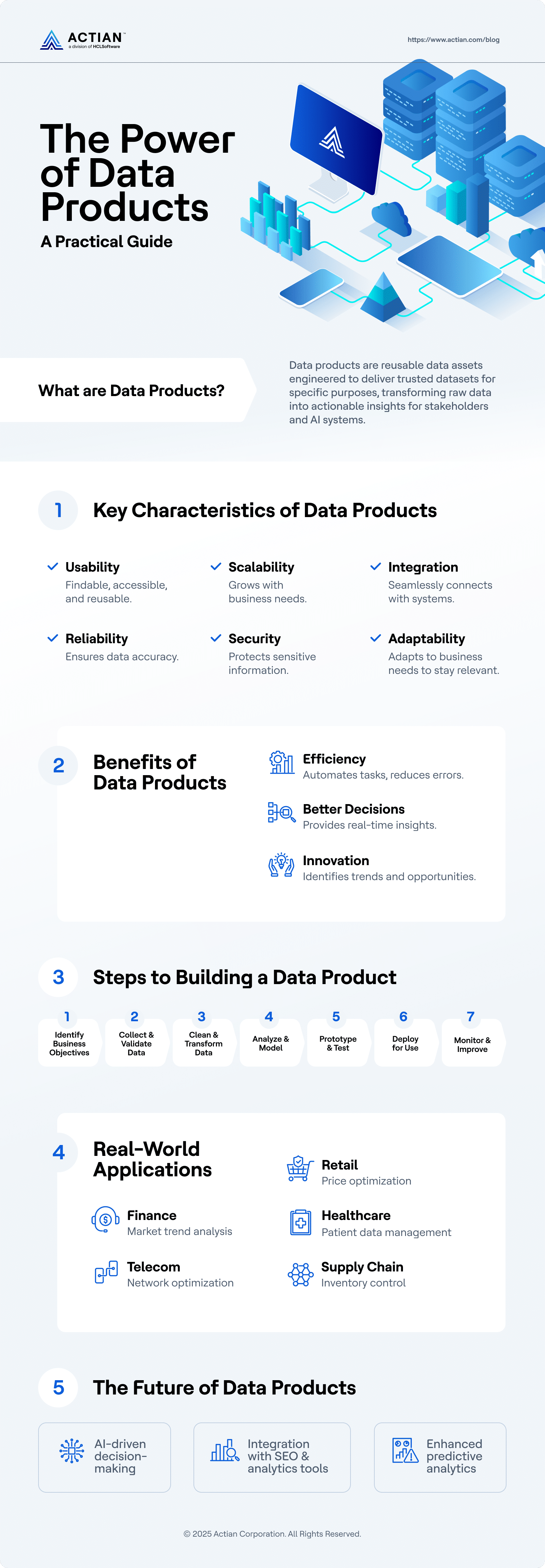In today’s fast-paced, data-driven world, data products have emerged as essential tools for businesses striving to make informed decisions. These products transform raw data into valuable insights, helping organizations to optimize operations and drive growth. As machine learning and advanced analytics become more prevalent, the capabilities of data products continue to expand, making them indispensable in modern business strategies.
Data products are designed to deliver actionable insights by integrating data analysis, predictive modeling, and visualization tools. This allows companies to gain a deeper understanding of their customers, streamline decision-making, and proactively respond to changes in market conditions. For instance, businesses can leverage data products for data governance to ensure accuracy and compliance, ultimately boosting confidence in decision-making processes.
By utilizing data products, enterprises can improve workflow management, resource management, and causal impact analysis. This not only sharpens strategic focus but also empowers organizations to adapt swiftly to market changes. As the future unfolds, the role of data products in shaping successful business models will undoubtedly grow, marking a significant shift in how data is harnessed for competitive advantage.
What are Data Products?
Data products are reusable data assets engineered to deliver trusted datasets for specific purposes, transforming raw data into actionable insights for stakeholders and AI systems. These products are designed to be accessible, consumable, and valuable, addressing particular business problems either internally within an organization or externally as monetized offerings. By integrating advanced technologies like machine learning, data products offer dynamic solutions, adapting to the ever-evolving business environment.
The significance of data products lies in their ability to streamline processes and enhance decision-making capabilities. They provide organizations with real-time insights, which are crucial for maintaining a competitive edge. Furthermore, these products often incorporate data integration techniques to ensure seamless access and analysis, thereby optimizing resource management and workflow efficiency.
Key Characteristics of Data Products
Usability
Data products are designed for easy access and use, making them valuable tools for everyday tasks. By incorporating user feedback, they become more intuitive and tailored to specific workflows. This user-centric approach ensures that data products are not only accessible but also enhance productivity through seamless integration into existing processes.
- Prepared: Cleaned, transformed, and high-quality data ready for analysis.
- Findable and Understandable: Metadata-driven and domain-centric assets built for effective use.
- Interoperable: Comprised of datasets that work together to provide holistic, unbiased insights3.
- Shareable: Packaged as a single trusted cohesive unit for easy distribution.
- Accessible: Available to data consumers when needed in a standardized manner.
- Reusable: Built of composable elements that can be used to create multiple data products.
Scalability
Scalability is a crucial feature of data products, enabling them to handle increasing amounts of data and users efficiently. As businesses grow, so do their data needs, and scalable data products adapt to these changes without compromising performance. This flexibility allows organizations to leverage their data resources effectively, supporting long-term growth.
Integration Capabilities
Effective data products seamlessly integrate with various systems and applications, ensuring a smooth flow of information. This interoperability supports data sharing and enhances decision-making processes across departments. By connecting different technologies, data products break down silos and foster collaboration within organizations.
Reliability
Users rely on data products to provide accurate and trustworthy information. Consistency in data structure and validation processes ensures data integrity, building end-user confidence. Reliable data products support informed decision-making, helping organizations achieve their strategic goals with certainty.
Security
Security is paramount in the design of data products, protecting sensitive information from unauthorized access. Implementing robust security measures safeguards data assets, maintains privacy, and complies with regulations. Secure data products provide peace of mind, allowing businesses to focus on leveraging data for innovation and growth.
The Benefits of Data Products
Efficiency Boost
Data products are a real game-changer in boosting efficiency across industries. Automating routine tasks frees up valuable time and resources, allowing teams to focus on more strategic initiatives. This leads to faster turnaround times and reduced costs, making organizations nimbler and more competitive.
- Streamlines processes and reduces manual errors.
- Enhances collaboration by providing real-time data access.
- Improves resource management and workflow management.
Informed Decision-Making
One key advantage of data products is their ability to enhance decision-making. By providing accurate insights and analytics, they empower leaders to make informed choices. This reduces the guesswork and helps in more accurately scoping and budgeting, ultimately driving business success.
For more on how data supports strategic decisions, explore metadata management.
Driving Innovation
Data products play a pivotal role in driving innovation within organizations. By offering fresh insights into customer behaviors and market trends, they inspire new ideas and solutions. This fosters an innovative culture where companies can experiment and adapt swiftly to changing environments.
How to Construct a Data Product
Step 1: Identification of Business Objectives
To create a successful data product, start by pinpointing clear business objectives. Engage with stakeholders to understand their needs and define the key performance indicators (KPIs) that will measure success. This foundational step ensures that your data product aligns with strategic goals and addresses specific business challenges.
Step 2: Data Collection
Once objectives are set, the next step involves gathering relevant data. Identify the sources of this data and ensure its quality through validation and verification processes such as data profiling. This stage is crucial for laying a robust foundation for further analysis and insights, facilitating effective data-driven decisions.
Step 3: Data Cleaning and Transformation
With the data in hand, clean and transform it to prepare for detailed analysis. This involves organizing and structuring the data to make it usable and insightful. Proper data preparation can significantly impact the effectiveness of the subsequent data analysis and modeling phases. There are tools, like Actian DataConnect, that can automate this part of the process for additional efficiency and error reduction.
Step 4: Data Analysis and Modeling
During this phase, employ statistical models and machine learning techniques to extract valuable insights from the data. This is where patterns and trends are identified, enabling the creation of a data product that provides actionable insights and enhances decision-making processes.
Step 5: Prototyping
Develop a prototype to test the initial concept of your data product. This allows for user feedback collection, enabling improvements before full-scale deployment. Prototyping is essential to refine the product according to user needs and stakeholder expectations.
Step 6: Production Deployment
After successful prototyping, integrate the data product into your existing tech stack and deploy it for production use. Ensure that the product is scalable and user-friendly, and complete all necessary documentation and training. Leverage streaming data pipelines to maintain real-time data flow and enhance functionality. A data catalog, like Actian Zeenea, can help to simplify the collection of metadata to ensure data products are discoverable, understandable, and trustworthy.
Step 7: Continuous Monitoring and Improvement
Finally, implement continuous monitoring to ensure the data product remains effective. Regularly update and refine the product based on user feedback and new data. This ongoing process helps maintain the product’s relevance and value in a dynamic business environment.
Data Products Examples
Data products are transforming industries across the board, providing innovative solutions that streamline processes and enhance decision-making. A prime example is price discount datasets used by retailers. By analyzing stock levels and sales data, they optimize discounts to reduce waste and cut costs. In the financial sector, software applications visualize sales data, allowing companies to uncover trends and drive strategic decisions. Healthcare relies on data products to manage patient care by analyzing medical history and treatment results, improving outcomes and reducing costs.
In telecommunications, data products are pivotal in optimizing network performance and improving customer experiences. For instance, network management systems use data to enhance telecom operations by monitoring and optimizing network performance. In the realm of customer service, platforms leverage data to personalize support, making interactions more efficient and satisfying for users. Additionally, mobile apps track data usage, empowering users to manage their consumption effectively.
Other industries also benefit significantly from data products. E-commerce giants like Amazon use big data for dynamic pricing and personalized recommendations, enhancing user satisfaction and boosting sales. Meanwhile, streaming services like Netflix employ advanced algorithms for content recommendations, increasing viewer engagement and retention. These examples showcase how data products are integral to modern business strategies, offering invaluable insights and operational efficiencies.
Automated Decision-Making Products
Automated decision-making products are revolutionizing how decisions are made across industries. By leveraging data, these products can make swift decisions without human intervention, boosting efficiency significantly. A case in point is a machine learning model predicting customer churn, enabling companies to retain clients more effectively by proactively addressing potential issues.
Algorithmic Products
Algorithmic products are essential for analyzing vast datasets and extracting actionable insights. They play a crucial role in sectors like finance, where algorithms assess market trends to inform investment strategies. For a comprehensive data migration strategy, companies can rely on these products to ensure seamless transitions and minimal disruptions.
Data Insight Products
Data insight products are invaluable for converting raw data into meaningful, actionable insights. These products empower organizations to make informed decisions based on data analysis. For example, a business intelligence platform might analyze sales data to identify high-performing products, helping companies strategize effectively and boost profitability.
Data Products in Action
Data products are reshaping industries by enhancing efficiency and decision-making. In healthcare, tools like Electronic Health Records (EHRs) streamline patient data management, improving accessibility for providers and researchers. Predictive analytics platforms forecast healthcare service demand, optimizing resource allocation and patient care.
In financial services, data products help businesses visualize sales data and manage risks through advanced data analysis. Machine learning models predict customer behaviors, aiding churn reduction and fraud detection. The supply chain sector benefits from data products by optimizing inventory and supplier management, ensuring seamless operations even in challenging times.
The Future of Data Products
With technology evolving rapidly, data products are on the brink of significant transformation. Emerging trends suggest a rise in automated decision-making tools, fueled by advancements in machine learning and causal impact analysis. Businesses can expect these innovations to drive better resource management and workflow efficiency, elevating how companies utilize data.
As market demands grow, data products will likely integrate more with platforms like Google Search Console and SEMrush for enhanced SEO forecasting and content production. This integration will enable businesses to create more precise content briefs and improve scoping and budgeting. Discover how the Actian Zeenea Data Intelligence Platform can enhance your data governance strategy.
Conclusion
Data products are transforming how businesses operate today. They offer a streamlined approach to gaining insights, ensuring data integrity, and enabling real-time decision-making. As organizations strive for efficiency and profitability, embracing data products becomes crucial in achieving positive outcomes.
Looking ahead, the role of data products in enhancing business agility and value will only grow. Companies should not overlook the potential of these tools in navigating the future technological landscape. Sign up for a product demo from Actian to discover how data products can benefit your organization.






